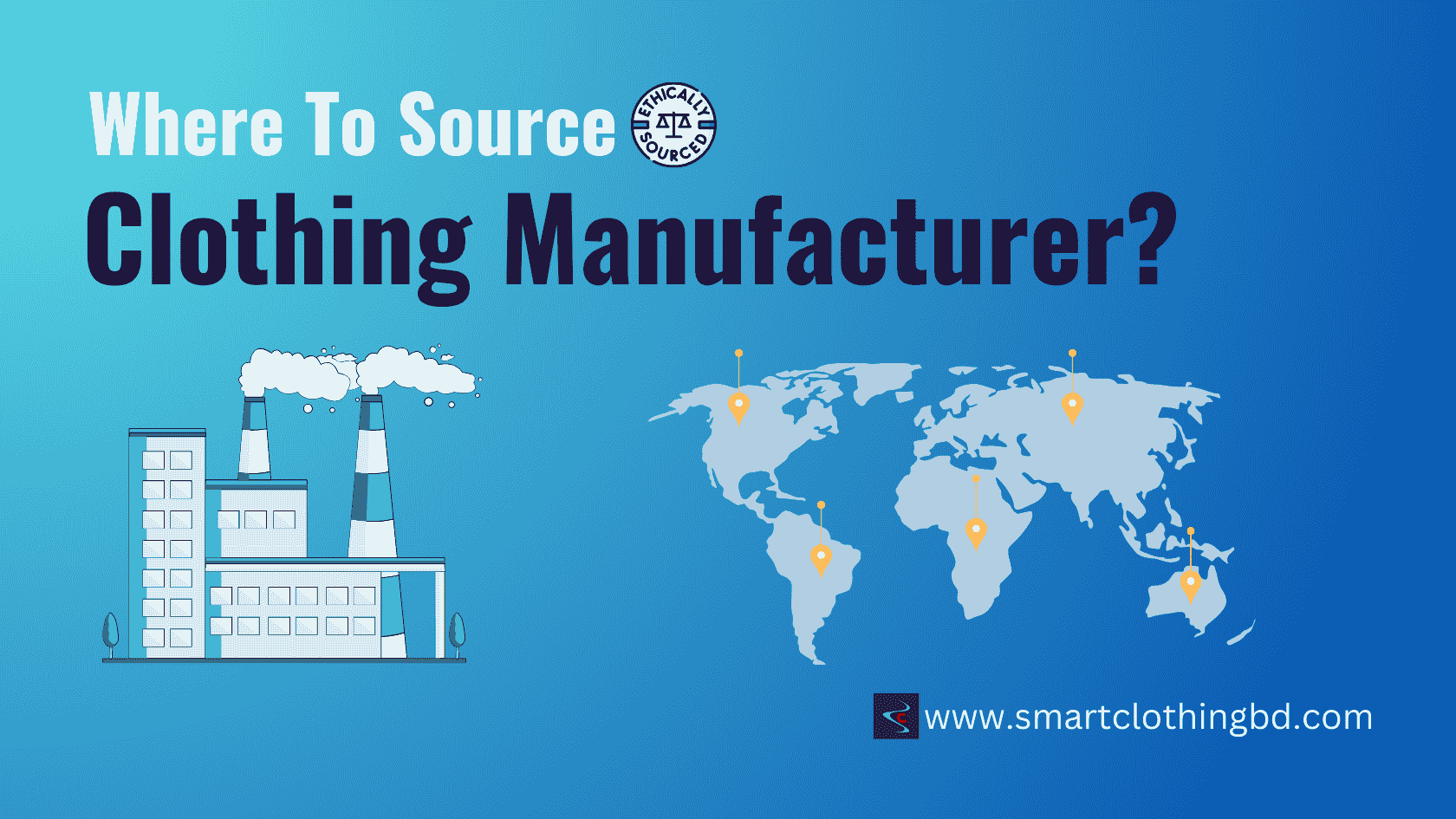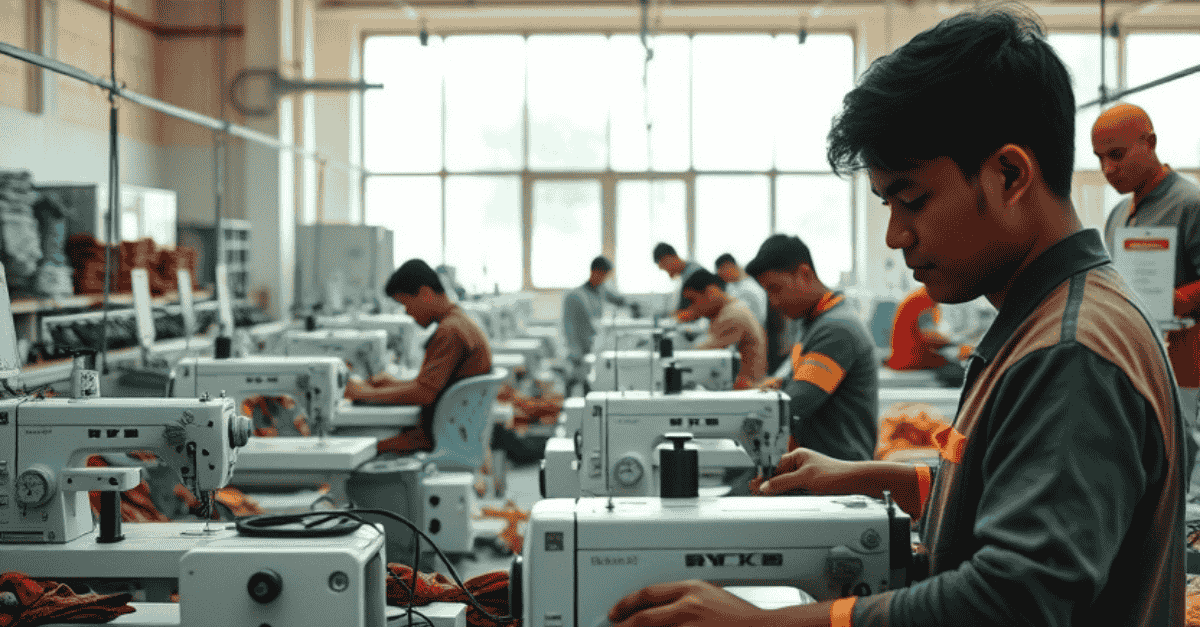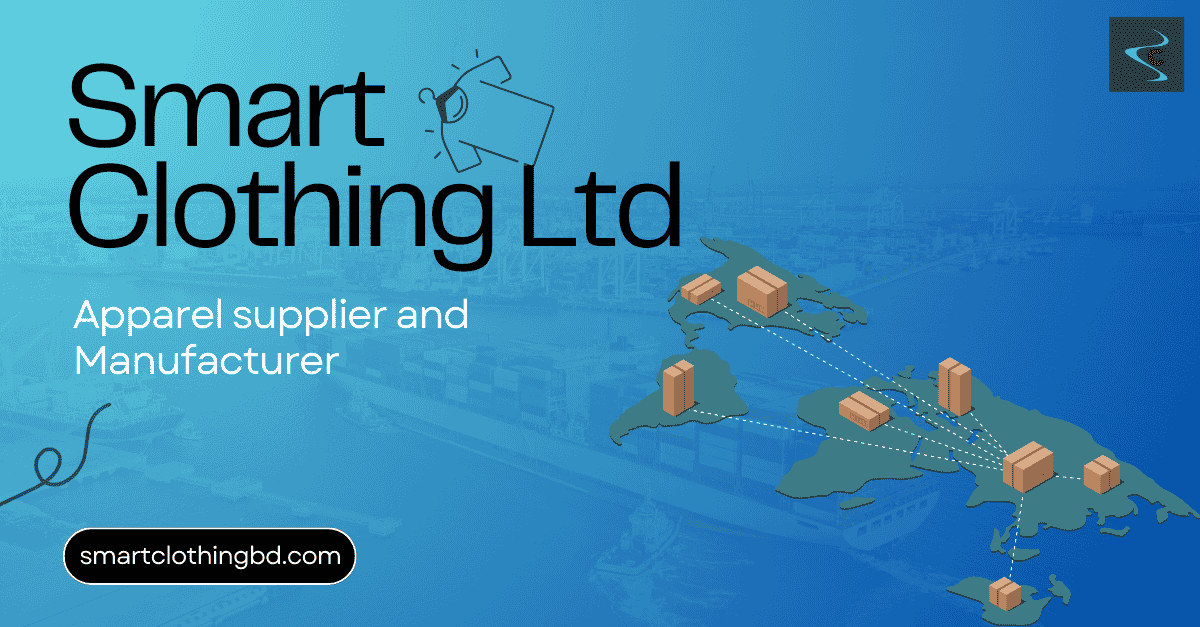
Starting or scaling a fashion brand is no small feat, and finding the right clothing manufacturers is a crucial piece of the puzzle. Whether you’re a fashion entrepreneur, an eCommerce business owner, or part of a purchasing team for a global brand, securing the perfect manufacturing partner can directly impact your quality, costs, and ability to meet customer expectations.
This guide will walk you through where to source clothing manufacturers, essential factors to consider, and insider tips to make the process smoother. Plus, we’ll introduce you to some trusted partners in apparel sourcing who are known for their expertise and proven track record.
Why Apparel Sourcing Matters
Sourcing is more than just finding someone to stitch garments. It’s about building partnerships with manufacturers who align with your brand’s values and quality standards. For many in the fashion industry, sourcing isn’t just about cost—it’s about timely delivery, ethical production practices, and scalable output.
But sourcing comes with its challenges. Communication gaps, quality concerns, and navigating international logistics can make the process overwhelming. However, with the right knowledge and strategy, you can position your brand for success.
Different Methods of Apparel Sourcing
1. Direct Sourcing
With this approach, you work directly with the manufacturer. This method can save costs as it eliminates intermediaries, but it requires strong industry knowledge and excellent communication skills.
Pros:
- Cost savings
- Greater control over the production process
Cons:
- Requires significant time and effort
- Potential for communication barriers
2. Agent-Based Sourcing
Here, a sourcing agent acts as the middleman, helping you identify the best manufacturers in their network. Also, agents often manage negotiations and oversee quality control.
Pros:
- Simplifies communication
- Saves time
Cons:
- Extra costs due to agent fees
- Less control over manufacturer relationships
3. Vertical Integration
Some companies prefer to own or partner directly with their manufacturers. This provides full control over the supply chain and ensures consistency. However, this approach is costly and generally suited for larger brands.
Pros:
- Full control
- Seamless supply chain integration
Cons:
- Significant upfront investment
- Limited flexibility
Key Factors To Consider When Sourcing Clothing Manufacturers
1. Quality Assurance
Your customers expect well-made products. Always request samples from potential manufacturers and evaluate their quality control measures. Look for certifications such as ISO and WRAP. Also, consider running a trial production to gauge quality and delivery timelines.
2. Production Capacity
Your manufacturer should be able to meet or exceed your demand while maintaining consistent product quality. Check their production capacity by asking for details on machinery, workforce, and output capabilities.
3. Ethical and Sustainable Practices
Consumers are increasingly conscious of ethical and sustainable practices in the fashion industry. Ensure that your manufacturers follow ethical labor standards and environmentally friendly processes. Certifications such as Fair Trade and GOTS can provide assurance in this area.
2. Cost Efficiency
While competitive pricing is essential, don’t compromise on quality. Factor in not just production costs but also shipping, customs, and potential delays. Consider asking for quotes from multiple manufacturers and negotiate where possible.
3. Location and Lead Time
Where your manufacturer is based matters. Countries like Bangladesh offer competitive pricing and compliance standards, but consider lead times and shipping logistics when choosing a location.
5. Flexibility for Startups
If you’re starting small, find manufacturers that cater to low MOQ (Minimum Order Quantity). This ensures you can launch without overproducing or overspending.
Best Regions to Source Clothing Manufacturers
When it comes to sourcing clothing manufacturers, it’s essential to consider multiple options to find the best place to source clothing. While Bangladesh offers a competitive advantage in terms of quality and compliance, other countries like China, India, Vietnam, and many more also boast robust manufacturing industries. These countries have long-established expertise in garment production and provide a wide range of options in terms of cost, scale, and specialization.
Bangladesh: The Global Hub for Quality Apparel Manufacturing
Bangladesh has emerged as a prime destination for clothing manufacturing, offering a winning combination of affordable costs, skilled workforce, and a commitment to international standards. Manufacturers like Smart Clothing Ltd exemplify excellence in both quality and compliance. When choosing Bangladesh as your sourcing region, you can expect the following advantages:
- Affordable Costs: Bangladesh offers competitive pricing, allowing businesses to optimize their production costs and maintain profitability.
- Skilled Workforce: The country boasts a large pool of skilled workers, experienced in garment production, ensuring high-quality craftsmanship and efficient manufacturing processes.
- Adherence to International Standards: Manufacturers in Bangladesh are committed to meeting international standards for labor practices, safety, and sustainability, providing assurance to brands and consumers alike.
To maximize your brand’s manufacturing potential, research manufacturers on platforms like Alibaba, Global Sources, or through Google. Request samples to assess product quality and delivery timelines. Conduct due diligence to ensure they meet your requirements. Sourcing from Bangladesh can open exciting opportunities for your clothing business.
China: A Manufacturing Powerhouse
China is a global leader in garment manufacturing, offering a vast network of factories and suppliers. Here’s why you should consider sourcing from China: innovation.
- Experience and Expertise: Decades of garment production have given China the knowledge and skills to deliver high-quality products efficiently.
- Cost Efficiency: China’s manufacturing capabilities allow for affordable production without sacrificing quality.
- Scale and Capacity: With a robust supply chain and skilled labor, China can handle both small and large orders, whether you’re starting a brand or expanding.
- Technological Advancements: Investments in technology and automation keep Chinese manufacturers efficient and innovative, staying ahead in the industry.
Vietnam: A Rising Manufacturing Powerhouse
Vietnam has become a key player in global clothing manufacturing, offering strong advantages for brands. Here’s why it stands out:
- Skilled Workforce: Vietnam has a large pool of skilled garment workers known for their craftsmanship and attention to detail, ensuring high-quality products.
- Cost-Effective Production: With lower labor and operational costs, Vietnam provides affordable manufacturing without sacrificing quality.
- Geographical Advantage: Located in Southeast Asia, Vietnam’s proximity to major markets like the US and Europe means shorter lead times and reduced shipping costs.
- Strong Infrastructure: Vietnam has invested in modern facilities and transportation networks, boosting productivity and ensuring smooth operations.
When Consider Using a Sourcing Agent or Buying House?
If this feels like too much to manage, consider working with a sourcing agent or buying house like Smart Clothing Ltd. They streamline the process by bridging any communication gaps, negotiating terms, and ensuring quality standards are met.
Pros and Cons of Sourcing with a Buying House or Sourcing Agent
Key Benefits:
- Expertise and Local Knowledge: Sourcing agents and buying houses have deep industry knowledge and insights into local markets, manufacturers, and production techniques. Their expertise helps navigate clothing sourcing complexities for efficient partnerships.
- Communication and Negotiation: They act as intermediaries, overcoming language or cultural barriers, and negotiating favorable terms on price, quality, and delivery.
- Quality Control: Clothing Sourcing agents ensure quality standards are met through inspections, minimizing the risk of substandard products.
- Supplier Network: They leverage established connections with reliable manufacturers to find the best partners based on cost, scale, and specialization.
- Time and Resource Savings: Garment Sourcing companies handle supplier selection, sample development, logistics, and inspections, freeing up buyers to focus on other business areas.
While there are clear advantages to working with a sourcing agent or buying house, buyers should also consider potential drawbacks.
The Drawbacks of Using a Garment Sourcing Agent or Buying House
- Additional Costs: buying houses charge a commission, which adds to production costs. Buyers should weigh these fees against their budget.
- Limited Control: Outsourcing gives buyers less control over supplier selection and communication, which can sometimes lead to mismatched expectations.
- Risk of Miscommunication: Despite their role as intermediaries, there’s still a chance of miscommunication between buyers and agents due to language barriers.
Innovations in Apparel Sourcing Industry
Online Platforms
Platforms like Alibaba and Global Sources simplify the search for manufacturers and provide reviews and ratings. These platforms allow buyers to connect with suppliers, view product catalogs, and request quotes, making the garment sourcing process more efficient and hassle-free. Buyers can also conduct due diligence by checking supplier credentials and verifying quality certifications.
Virtual Factory Tours
Technology allows buyers to tour manufacturing facilities remotely, saving both time and travel costs. Virtual factory tours provide a detailed look into production processes and capabilities, aiding in the selection of suitable suppliers for clothing sourcing. Some platforms also offer virtual trade shows, where buyers can interact with multiple manufacturers simultaneously.
Digital Supply Chain Management
The use of digital supply chain management tools streamlines the sourcing process by providing real-time visibility into supplier performance, order tracking, and quality control. These tools also facilitate communication between buyers and suppliers, reducing the risk of miscommunication or delays.
Data Analytics
AI tools now predict trends and help brands manage inventory, ensuring a more efficient production cycle. Data analytics also provide insights into sourcing patterns and supplier performance, allowing for better decision-making in the future.
Choosing the Right Sourcing Strategy
When it comes to sourcing clothing manufacturers, there is no one-size-fits-all approach. Each company’s unique needs and priorities should guide their decision-making process. While working with an apparel sourcing company or buying house can offer many benefits, it’s essential to consider the potential drawbacks and weigh them against alternative sourcing strategies. Ultimately, choosing the right approach will depend on factors such as budget, product complexity, production volume, and time constraints. Whether it’s working with a sourcing agent or leveraging digital tools and platforms, the key is to find a solution that aligns with your business goals and helps you build successful partnerships with reliable suppliers. So take your time in making this decision and choose wisely! With the right sourcing strategy in place, you’ll be well on your way to producing high-quality apparel at competitive prices.
Overcoming Sourcing Challenges
The process isn’t without hurdles when you’re trying to source clothing company. Here are some common issues and how to tackle them effectively.
- Communication gaps can be minimized by working with sourcing experts.
- Delayed deliveries require a strict timeline in your contract.
- Quality disputes can be avoided with detailed agreements and inspection processes.
- Cultural differences should be acknowledged and addressed through clear communication and mutual respect.
- Price fluctuations can be managed by negotiating fixed prices or setting a price range in the contract.
Ultimately, open communication, detailed contracts, and regular quality checks are essential for building strong relationships with suppliers for sourcing apparel and achieving your business objectives.
Top Clothing manufacturers for Startups

Top Clothing manufacturers for Startups
If you’re starting a fashion e-commerce business and looking for reliable overseas clothing manufacturers, or if you feel overwhelmed about how to source clothing from Bangladesh, here’s a curated list of clothing manufacturers in Bangladesh to help you get started:
1. Smart Clothing Ltd
Description: Smart Clothing Ltd is a well-established apparel sourcing and garment manufacturing company in Bangladesh, known for producing premium-quality knitwear.
Specialty: Low minimum order quantities (MOQs) and design assistance.
Key Products: Casualwear, T-shirts, and women’s apparel.
Address: Shiachar, Kutubpur, Fatullah, Narayanganj-1420, Bangladesh.
Website: smartclothingbd.com
2. Beximco Fashions Limited
Description: Beximco is one of Bangladesh’s largest and most diversified garment manufacturers, offering a wide range of apparel products.
Specialty: Large-scale production and fabric development.
Key Products: Shirts, trousers, and casualwear.
Address: Nishatnagar, Tongi, Gazipur, Bangladesh.
Website: beximco.com
3. Ha-Meem Group
Description: Ha-Meem Group is a leading supplier of readymade garments and denim fabrics in the world, with a strong focus on sustainability.
Specialty: Premium denim and sustainable production practices.
Key Products: Jeans, jackets, and casualwear.
Address: 407, Tejgaon Industrial Area, Dhaka-1215, Bangladesh.
Website: hameemgroup.net
4. DBL Group
Description: DBL Group is a diversified conglomerate with a strong presence in the textile and apparel sector, offering vertically integrated manufacturing solutions.
Specialty: Vertically integrated manufacturing and large-scale orders.
Key Products: Knitwear, casualwear, and sportswear.
Address: Kashimpur, Gazipur, Bangladesh.
Website: dbl-group.com
5. Square Fashions Ltd
Description: Square Fashions Ltd is a leading manufacturer of knitwear and woven garments, known for its commitment to quality and ethical practices.
Specialty: Knitwear and woven garments with ethical sourcing.
Key Products: Polo shirts, formal shirts, and trousers.
Address: Bhaluka, Mymensingh, Bangladesh.
Website: squaregroup.com
6. Epyllion Group
Description: Epyllion Group is a prominent textile and garment manufacturer in Bangladesh, known for its high-quality knitwear and woven products.
Specialty: Eco-friendly knitwear.
Key Products: T-shirts, polo shirts, and sportswear.
Address: Ninakabbo, 227/A, Tejgaon-Gulshan Link Road, Dhaka, Bangladesh.
Website: epylliongroup.com
7. Posh Garments Ltd
Description: Posh Garments Ltd specializes in producing high-quality ladies’ garments, offering flexibility for small-batch production.
Specialty: Low MOQ and customized garment solutions.
Key Products: Dresses, blouses, and shirts.
Address: Tejgaon Industrial Area, Dhaka, Bangladesh.
Website: poshgarments.com
8. Fakir Garments Ltd
Description: Fakir Garments Ltd is a leading manufacturer of knit garments, offering innovative designs and quick turnaround times.
Specialty: Fast turnaround and quality assurance.
Key Products: Knitwear, activewear, and children’s clothing.
Address: Fatullah, Narayanganj, Bangladesh.
Website: fakirgroup.com
9. Ananta Group
Description: Ananta Group is a leading Bangladeshi garment manufacturer, producing a wide range of high-quality apparel.
Specialty: Denim, formalwear, and activewear.
Key Products: Jeans, suits, jackets, and sportswear.
Address: Plot #246-249, Adamjee EPZ, Shiddirganj, Narayanganj-1431, Bangladesh.
Website: ananta-bd.com
10. Pacific Jeans Ltd
Description: Pacific Jeans Ltd is a global leader in premium denim manufacturing, recognized for its innovation and sustainable practices.
Specialty: High-quality, eco-friendly denim apparel.
Key Products: Jeans, denim jackets, and casual wear.
Address: Plot #14-19, Sector #5, Chittagong Export Processing Zone (CEPZ), Chattogram 4223, Bangladesh.
Website: pacificjeans.com
Why Choose Smart Clothing Ltd?

With over 12 years of experience, Smart Clothing Ltd has a reputation for delivering high-quality apparel to clients worldwide. Their services include product development, quality control, and production monitoring, making them a one-stop solution for all your sourcing needs.
Explore Their Special FOB prices here.
Take Your Next Step in Apparel Sourcing with Confidence
With this comprehensive sourcing guide, you are now equipped with the knowledge to make informed decisions in your apparel sourcing journey. Remember to carefully consider your business needs and priorities when choosing a sourcing strategy, and don’t hesitate to seek professional assistance from experts like M. Alauddin Bhuiyan. With the right approach and partners, you can successfully navigate the complexities of garment sourcing and achieve your desired outcomes. Good luck!